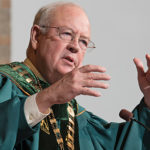TEMPLE—Austin Fischer became a Calvinist because his reading of the Bible offered him no other choice. He left Calvinism when he could not reconcile its tenets with the self-sacrificial love God demonstrated on the cross of Jesus Christ.
 Fischer, teaching pastor at Vista Community Church, a Baptist General Convention of Texas-affiliated congregation in Temple, wrote about his spiritual journey in Young, Restless, No Longer Reformed: Black Holes, Love and a Journey in and out of Calvinism. He is a graduate of the University of Mary Hardin-Baylor and Baylor University’s Truett Theological Seminary.
Fischer, teaching pastor at Vista Community Church, a Baptist General Convention of Texas-affiliated congregation in Temple, wrote about his spiritual journey in Young, Restless, No Longer Reformed: Black Holes, Love and a Journey in and out of Calvinism. He is a graduate of the University of Mary Hardin-Baylor and Baylor University’s Truett Theological Seminary.
Like many young evangelicals, the writing of John Piper provided Fischer’s introduction to Calvinism—a system of theology inspired by Reformer John Calvin that emphasizes the sovereignty of God, the depravity of humanity and the predestined election of some to salvation and others to damnation.
As a teenager, Fischer lost interest in the “narcissistic” and shallow idea that Christianity existed just to provide him security and make him feel good, he said. So, his youth minister at Denman Avenue Baptist Church in Lufkin suggested he read Piper’s book, Desiring God.
“It decentered me. It helped me realize it’s not all about me,” Fischer said in an interview. Instead, he learned from Piper, “It’s all about God’s glory.”
‘A place for postmodern refugees’
For him and many of his peers, Calvinism became “a place for postmodern refugees,” he explained. In a culture of skepticism when many see truth as relative, Calvinism offers stability, he said.
“It is something to hold it all together and give clarity,” he said. “Calvinism has a place for everything. It’s like a big, beautiful house with clear lines and strong accents of black and white. It offers a compelling remedy to postmodern skepticism.”
The writings of Piper and Jonathan Edwards, the 18th century Puritan theologian, gave him “a lens to see the Scripture through,” he said. And when read through that lens, he concluded, the Bible left him no option but to accept belief in unconditional election and the other teachings of Reformed theology.
Sign up for our weekly edition and get all our headlines in your inbox on Thursdays
Trancendence and mystery
Particularly, he became captivated by Calvinism’s emphasis on the transcendence and mystery of God. That focus initially helped him accept the notion that God predestined the salvation of those whom he elected to save.
 Austin Fischer“God is not just Superman minus the cape and red underwear—a being like us only way stronger and nicer. No, God exists on a completely different plane, shrouded in a veil of divine mystery,” he wrote in his book, describing his understanding as a convinced Calvinist.
Austin Fischer“God is not just Superman minus the cape and red underwear—a being like us only way stronger and nicer. No, God exists on a completely different plane, shrouded in a veil of divine mystery,” he wrote in his book, describing his understanding as a convinced Calvinist.
“God is not like us. And this means we cannot simply project onto God all the virtues we find desirable in humans. We cannot assume that God’s love, justice and goodness match up perfectly with our notions of love, justice and goodness.”
Eventually, however, he became unable to accept the idea God could create a relatively small number of people to elect for salvation and create much of humanity for no other purpose than damnation—a position called “double predestination” not all Calvinists hold, but one he believes consistent Calvinism demands. Fischer could not reconcile that with descriptions of God as loving, just and good.
“Calvinism forced me to call things ‘good,’ when they could only be considered the most morally repugnant atrocities imaginable, perpetrated by the Creator himself,” he wrote.
Goodness, love and justice
Furthermore, he realized if God speaks truthfully about himself and his purposes in the Bible, that demands belief in a trustworthy God. But God, as he understood him to be taught in Calvinism, defies human understandings of what goodness, love and justice means.
“If Calvinism is right and we are so unbelievably wrong about God’s love, justice and goodness due to our humanity, why should we think we are right about God’s integrity and truthfulness in revealing himself in the Bible?” Fisher asked.
“The relentless emphasis on mystery and transcendence had completely untethered God from the realm of ‘knowability.’ I could not relate to a God whose white was my black.”
Fischer found his way out of Calvinism when he grasped a simple but profound principle: “God looks like Jesus.” He asked if the God of his Calvinist understanding matched the God revealed in Jesus—particularly as seen in his sacrificial death on the cross.
“I found the crucified God very difficult to square with the God of Calvinism,” he said.
Jesus revealed a completely free and sovereign God who graciously chose to limit himself and give himself away in love on a cross, he concluded.
A God ‘who does not need us but does not want to be without us’
“Having let God speak for himself, I had found—or been found by—an infinitely glorious God, but it was not the God of Calvinism. It was the sovereign, self-giving, suffering, crucified God of Jesus Christ. It was the God who does not need us but does not want to be without us—not because we deserve it, but because that’s just who he is,” he wrote.
“And for me, this was a glory far beyond the self-glorifying God of Calvinism.”
At age 15, Fischer believed Calvinism gave him answers. Today, he knows he doesn’t have all the answers. Because of that, he can minister humbly alongside others at his church who interpret some of the Bible differently than he does—including those who identify themselves as Calvinists.
Fischer emphasized he did not write the book about his journey of discovery to bash Calvinists. Rather, he wants young evangelicals attracted by the mystery of God’s glory as emphasized in Calvinist theology to consider what he sees as a more compelling mystery.
“The Creator would rather die than give us what we deserve—that’s the supreme mystery at the heart of the universe, and it’s the kind of mystery I can live into,” he said. “There is nothing bigger and more challenging than self-giving love.”














We seek to connect God’s story and God’s people around the world. To learn more about God’s story, click here.
Send comments and feedback to Eric Black, our editor. For comments to be published, please specify “letter to the editor.” Maximum length for publication is 300 words.